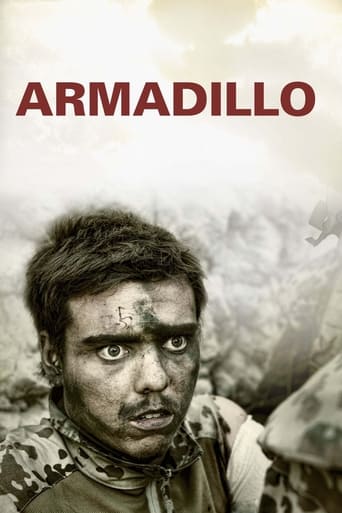

"Is there any man here that does not know that the seed of war in the modern world is industrial and commercial rivalry?" – Woodrow Wilson"Armadillo" documents the lives of Danish soldiers stationed at Helmand Province, Afghanistan. It purports to be an "objective" and "non partisan" war documentary, but this is not true.The film introduces us to a group of young soldiers days before they're shipped off to Afghanistan. Though they all have different faces, their motivations are largely the same; they view war as a rights of passage, a chance to define themselves, prove their manhood, go on an adventure and do "something important". These are trivial reasons to enlist, but the military has always been a cultic institution, preying on the anxieties and insecurities of the young.In typical war movie fashion, the rest of the film alternates between moments of downtime, and moments of tense, adrenaline pumping violence. At the end of the film, the Danish soldiers kill several Taliban soldiers. Later they discuss whether or not these murders were justified. Yes, they decide. End film."Armadillo" pretends to be apolitical, but the very act of avoiding all context is itself a firm ideological stance. Ignored is the fact that the Taliban have been deliberately dehumanised by the West for a number of decades. They are painted as irrational fanatics, bearded extremists, and terrorists. This, of course, paves the way for aggression, military operations, and genocide, all of which are waged under the guise of collective self-defence. Killing the Taliban is then celebrated as a legal virtue. To leave the Taliban in control of Afghanistan, says the US and NATO, is to leave a haven for terrorism.Yet before 9/11, these same "terrorists" were Washington's close allies. They were funded, supported and hailed as "freedom fighters" who with "our help" would be able to fend off the Soviet Union, whom the American public were told sought to destroy Afghanistan. Under the pretext that the Afghan government was a Soviet puppet, which was false, the then Carter Administration authorised the covert funding of oppositional tribal groups. These groups were armed and trained in secret camps set up in Pakistan by the CIA. Thus was born "mujaheddin", a campaign of terror which resulted in the Afghan government in Kabul requesting the help of the Soviet Union, resulting in an ill-fated military intervention which ended ten years later with the retreat of Soviet forces and the descent of Afghanistan into an abyss of religious intolerance, poverty, warlordism and violence. Contrary to "official history", the mujaheddin did not arise in response to a hostile Soviet invasion of Afghanistan. The Soviet Union intervened at the request of the Afghan government in response to the instability being wrought by a Western funded and armed insurgency. See Nicaragua, Syria, Iraq, Libya etc.After 9/11, Washington then turned against the very "allies" they supported, a pattern which we find occurring throughout history. Think the West's funding of Saddam Hussein against Iran, prior to sweeping in and wiping him out decades later. In the case of the Taliban, the justification for their newfound status as "our enemies" became their supposed links to the WTC attacks and their sudden "oppression of women". In reality the Taliban had nothing to do with 9/11, and were the White House concerned about women's rights they wouldn't be close allies with countless other counties, most notably Saudi Arabia and Pakistan, both of which practise an "Islamic Law" akin to the Taliban. The real reason for Washington's change of stance toward Afghanistan is this. During the mid 1990s several mega corporations began to seduce the Taliban, all seeking the granting of mineral rights. Eventually the deal came down to a handful of corporations, the Unocal-CentGas consortium (which later "became" Chevron, and which has ties to the Bush family and Dick Cheney) and Bridas (an Argentine company). While negotiations were underway, Bridas found a partner in gas giant Amoco and Amoco itself went on to merge with British Petroleum. Throw in the fact that Gazprom, a Russian gas company, pulled out of the Unocal-CentGas consortium and that Unocol's proposed pipeline was closed to Afghanistan, whilst that proposed by Bridas would also service the local market, and it looked likely that the Taliban would strike business deals with Bridas. In response, Unocal and its lackeys stepped up their game. Their Vice President of International Relations appeared before the US Congress in February 1998, calling for the removal of the Taliban regime. The Taliban themselves were issued an ultimatum: take our offer or we drop the bombs. Meanwhile, cue the Clinton administration's sudden concern about "human right violations" in Afghanistan, the seizing of all US-held Taliban assets, the placement of trade bans, and the calling for the "surrender of Bin Laden". In other words, it was only when absolute control of oil was challenged that the Taliban regime was openly discredited. Although the Taliban continued to offer negotiations on the handover of Osama bin Laden, the atrocities of 9/11 gave Washington oil policies a convenient new all-inclusive justification. Oil motivations, never a popular foreign-policy justification, could now be submerged within a primal response to a deep-seated national combination of fear, loathing and outrage.Incidentally, drug trafficking constitutes the third biggest global commodity after oil and the arms trade. Afghanistan produces 92 percent of the world's opium, the profits of which are laundered back to the West or channelled toward corrupt chieftains and locals. The longer the war can be prolonged, the more these 3 industries profit. Unsurprisingly, most of the major White House players during this era were affiliated with oil companies active in Central Asia (Condolezza Rice, Bush, Zalmay Khalilzad, Hamid Karzai, Cheney, Donald Evans, Gale Norton, Spencer Abraham, Thomas White etc). 4/10 – Says nothing you can't learn from a video game.
... View MoreAs the wars in Iraq and Afghanistan have dragged on they have produced an increasing number of provocative war documentaries that have shattered many of the myths about the black-and-white absolutes of war that have often been sold to those on the home front. Armadillo, which screened this week at Austin's SXSW Film Festival, is one of the best films yet produced about the reality of life during a war. The film follows a Danish unit assigned to Helmand Provence in Afghanistan during a 6 months tour. The filmmakers hold nothing back in this intimate portrait of soldiers at war. They present a picture of young men who seem to lose their humanity in the brutal circumstances of war. The visceral picture of combat is harrowing and the filmmakers should be commended for what they have captured on film.Americans need to see films like Armadillo as they contemplate why we are in Afghanistan. A film like Armadillo makes us ask ourselves if this war worth the human cost that we are paying and what it is doing to the soldiers that we are sending to fight these wars. The film has caused considerable controversy in Denmark. We need more films like it to bring this controversy to highly complacent America.
... View MoreThis is hands down the best war documentary I have ever seen. Most of it is beautifully filmed and put together, and it is showing how things are. I am a civilian, with a big interest in these things, and had my attention drawn to this movie because it seemed to get a thumbs up from people in the military. It sure shows controversial things, but balances them all the way, and show us both the civilian side with their troubles, and the danish soldiers side. Even at its controversial high point after a shootout it stays very neutral, and as such is a masterpiece of showing people the daily life of a soldier. My only gripe is that I had wished it a little longer, with more scenes that show the boredom that such a place must surely be, when nothing is happening.
... View MoreI went to see this movie with my mother. We come from Slagelse, the city where Gardehusarregimentet is situated, ie. the place of the danish camp from which these soldiers came from.Previously I have been stationed abroad with the military so I know a bit about the situation. I also know that my mother was worried all the time I was away, so I figured she would appreciate the movie. And she did.The movie is at times fun, but most of the time it's simply depicting the life I got to know. Lots of boring days, waiting for something to happen. It shows the exact same kind of stereotypes I saw myself, the quiet one, the gung-ho type, the smart-ass etc. I quickly tuned into the whole scenario.Armadillo might not be a masterpiece technically, but if you can stomach seeing it and NOT getting a lump in your throat, you're either without feelings or not alive. I remember the day I was going to ship off, the last conversation with my mom. And I was in my late 20s. Some of these boys are in their early 20s and far from mature. We get to see how the "hot" situations are down there and that is fine. But I would have liked more about their everyday boring life. Sure, it might not make for the most interesting movie material, but you don't get the exact picture of just how boring it can be too. Apart from that, a very well made movie. Oh and the controversy of the soldiers killing (lethally) wounded Talebans? I would have done the same thing. And I am almost a pacifist. I might not agree with the fact that we're shipping off people there still, but I agree with how the people down there reacts.
... View More